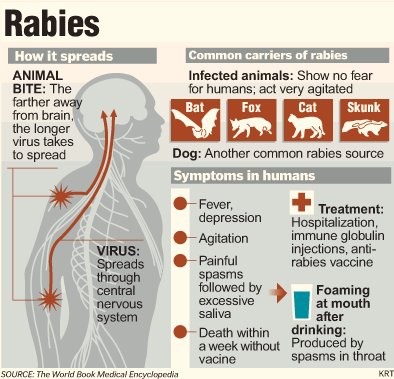Rabies Prevention And Care

Rabies is one of the most important Zoonotic Disease due to the fact that it is highly contagious and fatal in pets and humans. This virus is usually transmitted in the saliva of an infected animal, typically through a bite or through some entry into disrupted mucous membranes.
Normally, cats and dogs should be vaccinated against this virus after 12 weeks of age, again 12 months later and then every 3 years thereafter.
Your veterinarian will inform you if this is the procedure adopted by the state where you live in. The vaccine is very effective and is the best way to protect your pet and family against this deadly disease. We also recommend that you keep your pet indoors if you live in areas where bats, foxes, skunks or raccoons are present.
The virus is destroyed by vaccine-induced immune mechanisms when replicating in local tissue around the site of infection. Although, once it enters the nervous system, it is shielded and will replicate rapidly. At this point, infected animals have the virus in their saliva, which can infect other mammals up to 2-weeks before the animal shows signs of this deadly disease.
It can take from 2 weeks to 12 months for symptoms of the virus to appear from the time of the bite or other inciting incident. Unfortunately, once the symptoms are noticeable, death commonly occurs within 10 days.

Currently there is no accurate test to make a diagnosis on live animals. Common signs in cats are: aggression, restlessness, increased vocalization, loss of appetite, weakness, disorientation, lethargy, paralysis, and seizures.
Humans that contract the disease may start to show symptoms within two and twelve weeks. Early symptoms of rabies in humans include: irritability, headache, fever and itching or pain at the exposure site.
If you believe you've been bitten by a rabid animal you should immediately clean the animal bite or scratch wounds with soap and water, and seek medical attention immediately!
Again, the only way to prevent this disease is to have your pet vaccinated! If your outdoor cat has been bitten by another animal, you should contact your veterinarian immediately. Cats that are up to date with their vaccinations and who has been bitten by a possible rabid animal should receive a rabies booster vaccination and remain under observation for 45 days.
***Report any stray or ill animals to animal control***
Centers For Disease Control & Prevention
Return from Rabies to Cat Health
Return to Our Home Page
New! Comments
Have your say about what you just read! Leave me a comment in the box below.Healthy Cat Treat

Subscribe to Our Love Cats Digest e-zine
"A cat improves the garden wall in sunshine, and the hearth in foul weather." - Judith Merkle Riley
Marketing Strategies by










New! Comments
Have your say about what you just read! Leave me a comment in the box below.